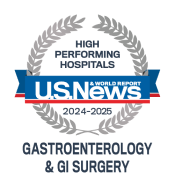Liver Disease

The liver, a large organ located under the rib cage on the right side of your body, performs many functions, including removing harmful substances from your blood. When inflammation occurs in the liver, it can repair itself, but in the process build up scar tissue; extensive scar tissue replaces healthy liver, thereby impairing liver function, a condition called cirrhosis.
If liver disease is found early, the expert hepatologists at the University of Maryland Digestive Health Center can minimize liver damage and create the right conditions for the liver to regenerate healthy tissue. If cirrhosis is already present, our expert hepatologists can work with you to prevent its progression, screen for liver cancer and, if needed, start the liver transplant evaluation.
Our specialists also work with the Diabetes and Endocrinology departments to provide the best treatment for your liver disease.
Nonalcoholic Fatty Liver Disease (NAFLD)
NAFLD, a general term for a condition not caused by alcohol use, is characterized by excess fat in liver cells which tends to develop in those who are overweight or obese and have diabetes and high cholesterol. NAFLD is a leading cause of cirrhosis in the United States. It is important to diagnose NAFLD early in its course, as control of risk factors can prevent disease progression.
For those who are interested and meet enrollment criteria, clinical research trials evaluating new treatments are available through our providers. We also offer screening to those who have a high risk of developing NAFLD, and a noninvasive liver scan for patients who qualify.
- Learn more about how we can help treat nonalcoholic fatty liver disease.
Liver Cancer
Patients with cirrhosis have an increased risk of liver cancer. In its early stages, liver cancer often does not cause symptoms, so screening with abdominal scans is very important. If liver cancer is detected early, many treatments are available to slow tumor growth and potentially offer a cure.
Our providers are integral members of the University of Maryland Liver Cancer services, which can streamline and coordinate care.
- Learn more about our liver cancer treatment.
Cirrhosis of the Liver
The most common conditions that cause cirrhosis are alcohol overuse, viral infection (hepatitis B and C), and nonalcoholic fatty liver disease. In its early stages, cirrhosis causes few symptoms and can be prevented or reversed. More advanced cirrhosis may result in jaundice (yellow eyes or skin), encephalopathy (confusion), ascites (abdominal swelling), and internal bleeding, and may require a liver transplant.
Our hepatology providers are part of the University of Maryland Liver Transplant Program and are well-qualified to evaluate and refer patients for liver transplantation.
Liver Transplantation
Surgical liver transplantation replaces a cirrhotic liver with a donated, healthy liver, a treatment considered for those with cirrhosis who develop serious complications and liver failure.
- Learn more about University of Maryland' outstanding, high-volume liver transplant program.

